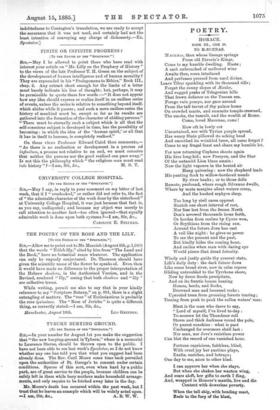FINITE OR INFINITE PROGRESS ?
I TO THE EDITOR OP THE " SPECTATOR."1
Sra,—May I be allowed to point those who have read with interest your article on " Mr. Lilly on the Prophecy of History " to the views of the late Professor T. H. Green on the subject of the development of human intelligence and of human morality ? They are expounded in his "Prolegomena to Ethics," Book DI, chap. 2. Any extract short enough for the limits of a letter must barely indicate his line of thought; bat, perhaps, it may be permissible to quote these few words :—" It does not appear how any idea should express or realise itself in an endless series of events, unless the series is relative to something beyond itself, which abides while it passes ; and such a mere endless series the history of mankind must be, except so far as its results are gathered into the formation of the character of abiding persons." " There must be eternally such a subject which is all that the self-conscious subject is developed in time, has the possibility of becoming : in which the idea of the human spirit,' or all that it has in itself to become, is completely realised."
On these views Professor Edward Caird thus comments,— " As there is no realisation or development in a process ad infinitum, a process not relative to an end, we must conceive that neither the persons nor the good realised can pass away." Is not this the philosophy which " the religious man must read into history " P —I am, Sir, &c., M. S. T.


































 Previous page
Previous page